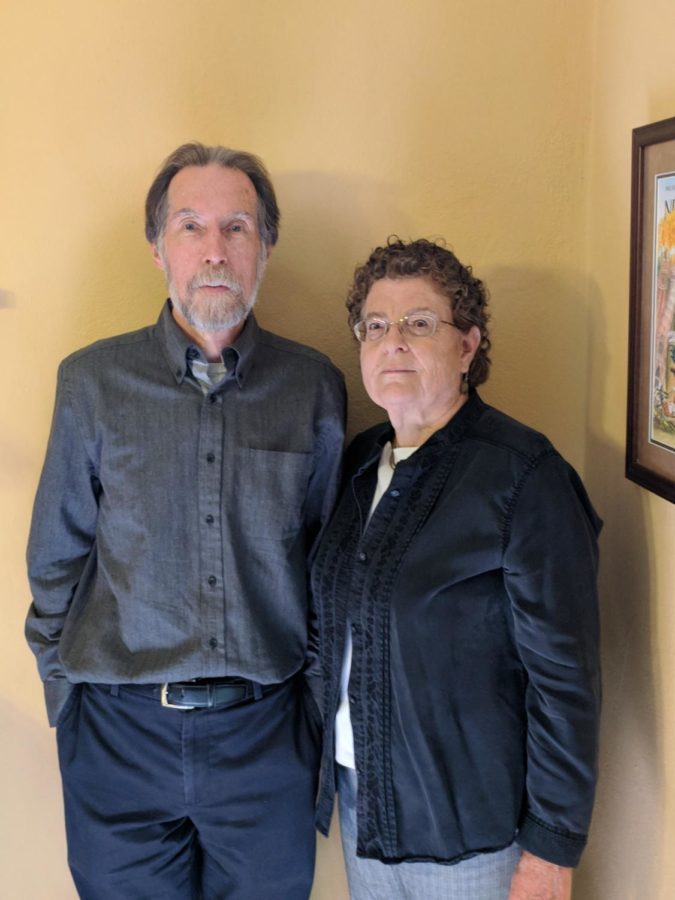Iowa State community unites in response to Pittsburgh synagogue shooting
Barbara Pleasants an adjunct assistant professor in the Department of Ecology, Evolution, and Organismal Biology and her husband John Pleasants.
November 1, 2018
Unity, togetherness and support ran through the Ames and Iowa State communities in wake of the recent synagogue shooting that took place Sunday in Pittsburgh.
The shooter killed 11 people Sunday, armed with multiple firearms when he opened fire inside of The Tree of Life Congregation, eventually surrendering to police after barricading himself on the third floor of the building.
A vigil was organized and held Sunday afternoon on Central Campus to mourn the people lost in the mass shooting.
“There’s not a very large Jewish community here, so, when events like this happen we all kind of come together more,” said Rizhsky-Yakobson, a senior in computer engineering and vice president of Hillel.
Barbara Pleasants, a faculty member in the department of ecology, evolution and organismal biology, said there has been a rush of support from the Ames community.
“Immediately the synagogue received emails of support from people in Ames,” Barbara Pleasants said of the Ames Jewish Congregation. “People brought flowers to the synagogue with notes of sympathy or support, so the community [has] been very supportive.”
Rizhsky-Yakobson said the recent shooting, as well as the general social climate, while not making him feel increased personal discomfort, has made him more hesitant about being openly Jewish and outwardly practicing and displaying his faith.
“It was devastating for me to hear about what happened because in one of the safest possible places theoretically that you could be — at a synagogue, praying, someone came and just opened fire, and that was so scary and horrifying to hear about,” Rizhsky-Yakobson said. “I don’t even know what to say about the event. It’s just so awful that there’s still people who care so little about others that they’re willing to go and just completely ruin the lives of [hundreds, if not thousands.]”
John Pleasants, president of the Ames Jewish Congregation and adjunct assistant professor in the department of ecology, evolution and organismal biology said he has been contacted by Iowa State University about exploring different ways to help Jewish students feel more safe on campus.
“It’s an awful tragedy, what happened, and I just hope we see less and less of this, even though there’s more and more tragedies and shootings like this happening around the country,” Rizhsky-Yakobson said.
Continued and increased empathy, listening and awareness are all things Rizhsky-Yakobson hopes to see more of both nationally and in the Iowa State community going forward.
“I hope that people in the community, regardless of what they identify as, I wish that they could just be more considerate of each other and other groups around them,” Rizhsky-Yakobson said.
Barbara Pleasants also said there is cause for concern in the misinformative and hateful rhetoric that is often shared falsely as news on the internet.
John Pleasants spoke to the frequent isolation between communities of different identities, and the need for people to come together and listen to each other.
“We are all in bubbles and we’re in a bubble, and that’s different from somebody else’s bubble, and somehow the bubbles have to come together to share perspectives,” John Pleasants said.
Jeremy Best, assistant professor in the department of history, offered a definition of the ideology of modern antisemitism can be seen throughout, roughly, the past 150 years.
“Anti-Semitism is particularly the racialized, modern version of anti-Jewish hatred,” Best said.
Best said anti-Semitic values are most commonly seen in times of societal stress, referencing the 1920s and 1930s in America, as well as continued attitudes of anti-Semitism in communities that feel disadvantaged or stressed in the current economic climate of the United States.
“Jews frequently stand in as a generic villain, as something to put resentments of the system on, so that’s why terms like ‘globalist or cosmopolitan or internationalist,’ these are frequently words used to identify things that are outside of the community,” Best said, “Because Jews have pretty much always lived in the same places as Christians and have always been a minority in those places and have a long history of coexistence with Christians, they are usually the most convenient ‘outsider’ or ‘foreigner’.”
While he does not apply these terms or identities to Jewish people, historically, those who take these anti-Semitic attitudes often come to this conclusion, Best said.
Barbara Pleasants said she has heard these ideas and rhetoric from Iowa Representative Steve King and has used white nationalist rhetoric while expressing xenophobic and anti-semitic sentiment.
Barbara Pleasants also said she encouraged all of her students to speak out when they see or here any ethnic group being disparaged.
“I’ve taught the holocaust here, besides biology, for 25 years, and I talked to all of my students about this last night,” Barbara Pleasants said. “What led up to the holocaust seems to be, especially for young people, a long long time ago but we see very similar rhetoric right now.”
Editors note: A clarification has been added to show John Pleasants and Barbara Pleasants’ involvement with the Ames Jewish Congregation.







